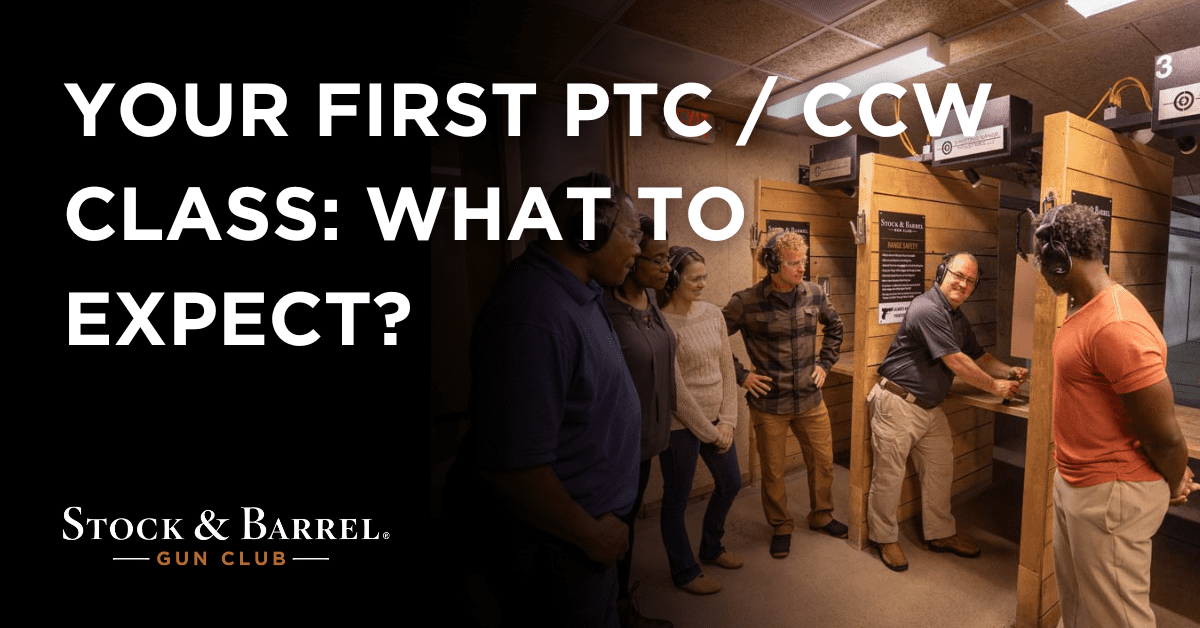Filing for your PTC (Permit To Carry) or CCW (Concealed Carry Weapon) Permit, as its named in other states, can be a somewhat intimidating experience. Shooting targets on a range but making the decision that you’re willing to use your pistol in self-defense is another level of commitment, entirely. Because of this, many states have enacted training requirements for those who wish to carry weapons on them personally for protection. Every state is a little different, but the requirements across states share a lot in common.
WHAT A PERMIT/LICENSE COURSE IS…
The goal of a permit/license course is to make sure you understand your state’s laws as they pertain to carrying a weapon. There are certain areas you will not be allowed to carry. Some are consistent, others less so. For example, government buildings like court houses, post offices, police stations and municipal offices are almost always off-limits, as are school zones. Other places get a little tricky, like establishments that serve alcohol. Can you carry in a bar, as long as you don’t consume? Can you carry in a bar/restaurant, as long as you stay in the seating area for food service? In some states, individual cities have their own, separate permitting process (New York City is the best known example of this). If you are carrying, and you get pulled over by a police officer, are you legally required to inform him that you’re armed? These are the sort of general “administrative” rules of concealed carry you can expect to learn in a PTC/CCW class.
In addition, you will also learn your state’s rules on when you are legally permitted to utilize deadly force. You will be required to understand whether you state has Castle Doctrine, Stand Your Ground, or Duty To Retreat laws in place. Some states also have specific rules governing liability of the armed citizen in cases of defensive shooting or negligent discharge. There may also be particular “Good Samaritan” laws on whether or not you can intervene on another person’s behalf. Depending on your jurisdiction, the laws surrounding legal carry and use of a firearm can get complicated, and nobody who goes through the trouble of attaining a proper permit/license wants to run afoul of the law because they didn’t pay attention in class.
WHAT A PERMIT/LICENSE COURSE IS NOT…
There may be a live-fire qualification during your class – again, depending on your state and local laws. Some places, you have to qualify with each individual firearm you intend to carry. In others, you just need one qualification to demonstrate proficiency. The standards are fundamental in nature, with generous scoring areas and many do not have time limits, or requirements to draw from the holster or move. You do not need to be a crack shot to pass your state’s PTC/CCW qualification. Which is exactly the point of this paragraph. Your permit/license class is not a shooting course. While you will not be pushed or stressed during the live fire qualification (if there is one) you do need to know how to shoot and operate your pistol. The instructor may be able to give you some pointers, but there is not time built into the class for you to train, or for dedicated instruction on how to operate your pistol. We recommend you learn your state’s qualification course ahead of time and practice it a few times before your class.
Do not expect to come out of this class a better shooter. You will fire the minimum number of rounds to qualify and that’s it. You will not be taught any new shooting-related skills or have sufficient repetitions to develop proficiency. The environment will be low stress, friendly, collaborative, and supportive in nature. The instructors want you to pass. You will not be yelled at, treated like a soldier in basic training, or expected to shoot like a Navy SEAL. But you will be expected to load your pistol, fire it accurately at the distances required, and unload it all without violating the tenets of basic firearms safety.
HOW TO BE A GOOD STUDENT
Being a good student in your PTC/CCW class is just like being a good student anywhere else. Listen carefully, take notes, ask thoughtful questions, and don’t be afraid to engage the instructor in dialogue if you’re unsure of any of the material. This is not math class. If you walk away unsure of the law, the consequences could be dire for you later on.
In these classes in particular, it’s important to have the right mindset. The point of carrying a concealed weapon is to protect yourself or your immediate family under the worst possible circumstances. A surprising number of people walk into permit/license classes with a focus on “when am I allowed to shoot someone?” which is kind of like asking for the punch line before you hear the joke. Good instructors will have enough knowledge to make you think about when you should shoot, which is not every situation where you may be legally allowed to.
NEXT STEPS
Perhaps the single most important next step is this: do not mistake qualification or licensure with skill. Shooting requires many hours and practice rounds fired to be comfortable shooting under high-stress conditions. Likewise with drawing you weapon from its holster, putting it back into the holster. These topics will not only be covered but trained extensively if you sign up for defensive pistol classes. You can also look for local shooting competitions in your area. You don’t need to compete to win a gold medal. Many people compete simply to experience the stress of shooting their pistol with the added components of drawing, movement, and time-based restriction. Regardless of whether you compete or take classes (or both!) you should not assume your state’s legal qualification to be an endorsement of your marksmanship or gun-handling ability.
You may also want to consider concealed carry insurance, which can offer legal services in the event of a shooting, as well as liability coverage for anyone involved in such an incident, or defense in the case of a civil court case. While not required in most places, this is just as prudent an idea as any other kind of insurance you carry in your day-to-day life.
The road to becoming a responsible concealed carrier is challenging, but highly rewarding and full of people who want to see you succeed along the way. Go slow, be thorough, and learn as much as you can.
OTHER BLOGS YOU WILL FIND OF INTEREST:
- Why 1-on-1 Training with Firearms is Invaluable
- Securing and Protecting your Firearms
- Pistol Shooting Competition Options
CLASSES YOU MAY BE INTERESTED IN:
- Competition Shooting Skills in Chanhassen
- MN Multi-State Permit to Carry in Chanhassen or Eagan
- Women’s Only Permit to Carry in Chanhassen or Eagan





